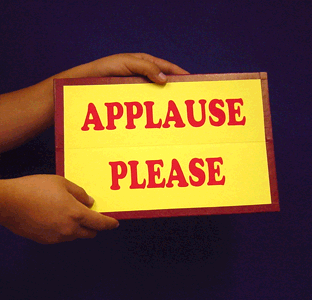Flatter me, and I may not believe you. Criticize me, and I may not like you.
Ignore me, and I may not forgive you. Encourage me, and I may not forget you.— William Arthur
I’m turning the big 5-0 in December and have spent this whole past year declaring, “I’m 50, I’m 50”, when, in fact, I was 49 all along…and still am, for that matter! Now, however, with December 6 looming close, I have regrets. My 21 year old daughter has admonished me these past 10 months (what does she know about aging, anyway???) for not appreciating that I’m still 49 and should acknowledge that truth (to both myself as well as others); but I didn’t listen. Somehow, I thought if I declared my 50 years before their time, the possible shock of it all on the actual date would be lessened. And while that may turn out to be true, and while I’m not all that hung up on age, now that it’s really getting too late to do anything about it, I wish I had said I was 49 this past year, when the topic of age presented.
What does this have to do with appreciating staff, colleagues, clients and even you? Well, as Singer/song-writer, Joni Mitchell said–in her Big Yellow Taxi song, circa 1970–“Don’t it always seem to go, that you don’t know what you’ve got till it’s gone.” At work, we can spend so much time lamenting the “good old days”, or looking towards the future with grand hope and expectations, that we fail to see what’s good about our current workplace situations and positions.
Sure, it’s terrific and valuable to reflect on where your team’s been in 2007 and where it’s headed in 2008, but it’s also valuable to stand still for a moment and appreciate “where you’re at”, individually and collectively, today. And whether that’s a “good” place or “bad”, appreciate the lessons offered by the situations, circumstances, staff, colleagues, and even clients, involved.
To appreciate your current workplace reality, complete the following statements:
- Today, as a member of this team/this organization/profession/industry, I am…
- Today, as a member of this team/this organization/profession/industry, I feel…
- One thing I appreciate about my team is….
- Another thing I appreciate about my team is…
- One thing I appreciate about the most disagreeable person on my team is…
- Another thing I appreciate about the most disagreeable person on my team is…
- One thing I appreciate about my favourite team member is…
- Another thing I appreciate about my favourite team member is…
- One thing I appreciate about the person to whom I report is…
- Another thing I appreciate about the person to whom I report is…
- One thing I appreciate about the most disagreeable client with whom I must deal is…
- Another thing I appreciate about the most disagreeable client with whom I must deal is…
- One thing I appreciate about the most delightful client with whom I must deal is…
- Another thing I appreciate about the most delightful client with whom I must deal is…
- One thing I appreciate about my own workplace contributions is…
- Another thing I appreciate about my own workplace contributions is…
If you’re in a position of official leadership, you may ponder, “What to do, what to do, to encourage my staff?” You may ponder this because you embrace the leadership insight:
The spirited horse, which will try to win the race of its own accord,
will run even faster if encouraged.— Ovid
Or perhaps you make it your business to be concerned about expressing staff appreciation because you fret that this quote may be true:
People may take a job for more money,
but they often leave it for more recognition.— Bob Nelson
It doesn’t matter which of these two philosophies drives you, as long as people are appreciated and know it; and it has to come from you, directly. Case in point: A couple visits a marriage counselor, for the woman feels overwhelmingly under appreciated by her husband. The counselor asks the woman to begin by sharing her “complaints”. She goes on and on at great length. While still rambling a blue streak, the counselor arises from behind his desk, scoops her into his arms and gives her a big kiss. Not only does the woman stop her tirade, she swoons into a state of bliss and peace. The counselor turns to the husband, directing, “Your wife needs this at least three times a week. Do you think you can handle that?” The husband replies, “Well, I can bring her in on Mondays and Wednesdays, but Fridays are my golf days.”
At the risk of taking some heat for sharing a silly little ditty steeped in plenty of stereotype (not to mention the counselor’s professionally inappropriate behaviour), I share this joke to make a point about appreciation…that the simplest of gestures may be all it takes to make another feel appreciated and acknowledged, and these gestures must come from the proper sources; yet still, for some, it’s too much (“can’t do it on Fridays”!). Official leader or not, can you handle it? Can you handle taking the time, three times a week, to express your appreciation to another (and, by the way, include yourself in that formula, too)…so that the people you appreciate can say (as Sally Field once cried), “You like me! You really like me!”?
Consider these 12 suggestions for expressing appreciation to your staff and/or colleagues:
- If you don’t intuitively know what expressions of appreciation they’d most welcome, conduct a formal or informal survey asking staff to share the ways in which they’d most like to receive your gestures.
- Ensure you express your periodic appreciation to all staff…from the most “visible” and highly profiled, to the most seemingly “invisible” of frontline staff.
- Be specific; tell people exactly what they did to inspire your expression of appreciation (including clients, too).
- 2008 is fast approaching; get a jump start on personal resolutions; resolve, now, to be an exemplary personal or positional leader of improved office grace and etiquette–year-round–to build your team’s confidence, cohesion and commitment to the organization.
- Send emails of appreciation, with specific examples of why you are expressing your appreciation.
- Send hand-written notes of appreciation, too; often very appreciated by the recipients because so few people take the time to hand write notes these days.
- Send after-hours voicemails to say “thank you”; ones that will be picked up at the start of those appreciated individuals’ next working day; connecting verbally, even if not in real time, adds warmth to your appreciation (some may even save such messages for play back down the road, on some particularly trying day; your one expression of appreciation may end up giving to another repeatedly!).
- Take the time to know your coworkers’ or staff’s interests well enough to present a small gift occasionally eg. even the clipping of an article they’d enjoy; an appreciated gift, and the gesture of providing it–whether or not it has a price tag–will surely brighten another’s day.
- Provide opportunity; staff want chances for professional development; they want to attend in-house events, professional association meetings and conferences, and represent your organization at charitable events.
- Encourage others to express appreciation to one another…to follow your lead and “pay it forward” .
- Print business cards for all staff; it’s amazing how this little gesture makes employees feel valued and worthy; from time-to-time I’ve asked certain individuals for their cards, only to be told, “My employer doesn’t provide cards for my position”; too bad…that employer misses the mark…and an opportunity to have all staff proudly promote the goodness of their organization.
- Share a letter of praise from a client/customer/external stakeholder directly with the employee who delivered the service, and ensure that note finds its way to the employee’s HR record (and perhaps your local staff bulletin board, too).
Sometimes, in some “sick” corporate cultures, expressions of staff appreciation rarely, if ever, occur. What’s an individual to do? It’s nice, and even feeds the soul, when your employer acknowledges and appreciates your professional gifts and talents but, if they are not being recognized, you must at least acknowledge them for yourself! Another case in point: Cardiff, Wales’, Paul Potts was a “regular” kind of guy–a U.K. cell phone salesman who never really felt all that sure about his abilities, and confessed difficulty with self-confidence. One day, finally, his passion outweighed his self-imposed lack of appreciation and confidence in his natural professional talent. He stepped on to the Britain’s Got Talent stage and the rest, as they say, is history. To experience this personally, and perhaps to give yourself your own inspirational butt-kick for fully appreciating what you bring to your professional workplace table (and may be hiding), as well as appreciating what others contribute, watch this video now. As you watch, note the faces of the judges, both at the start and during Paul’s performance. You can almost hear their thoughts of, “Oh God…here we go again…another salesperson who thinks he’s got talent…”, and then you can clearly see their minds change and their appreciation blossom:
Paul Potts got a new job. His premiere album was released on July 16, 2007 and quickly reached number 1 on the UK Albums Chart, with similar honours around the world. He’s now a multi-millionaire, all because he finally appreciated his true professional talent…when he did that, others keenly followed.
So it’s back to turning 50 and appreciation of it. Good thing I subscribe to the thinking that, as with football and other sporting games, when it comes to the game of life and work, all the best “scoring” happens in the second half! If you’re over 50, this philosophy may prove comforting and reassuring; if you’re under, take heart in knowing that the best of your professional achievements, and expressions of appreciations thereof, are yet to come. In the meantime, appreciate and acknowledge the value of all that comes your way at work today.
The best way to appreciate your job is to imagine yourself without one.
— Oscar Wilde
Treat people as if they were what they ought to be and you help them to become what they are capable of being.
— Johann Wolfgang von Goethe
By appreciation, we make excellence in others our own property.
— Voltaire














